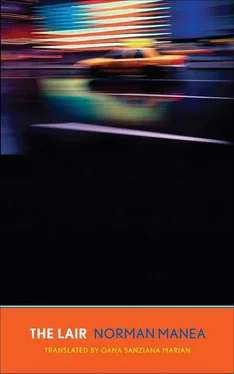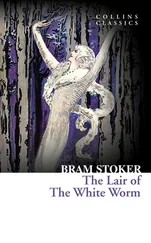When he awoke, the nurse had widened. Now she wore glasses and looked Mongolian. She was smiling, happy, motherly, an immaculate set of teeth. The thermometer. In his mouth, under his tongue. “Okay, you don’t have a temperature and your blood pressure is normal.” She’d removed his bedpan, she brings a small plate with five colored pills and glass of water. Soon, it’s time for breakfast, then the morning visit, then discharge. The patients stay only one night, that’s the rule, time is money, the sick person comes, leaves, the bill remains, the Soviet Boltanski was right. The telephone.
“I’m Doctor Bar — El. How do you feel, Professor? Hostal told me that you had 95–to–99 percent blockage. We caught it in time, I felt the urgency. Everything is okay, I will see you in two weeks.”
Hostal appeared, like a chef in white with a chef’s bonnet, fresh out of the cookie lab. Small, solid, trustworthy. In his hand, the folder full of cliches.
“Here is the image of what’s been done and what is left to be done. Here’s the narrowing of the artery, here the other artery, the corner of the curvature, the casing. There were constrictions in three places along one of the arteries. It’s the latest kind of stent, treated with a protective substance that impedes future buildup. I hope you are feeling well. The angioplasty must be repeated. We’ll repair the other arteries in two months. I know Koch, he told me about you. He also told me how delicious breakfast is in Bukovina, thick sour cream with wild strawberries.”
No, Doctor Hostal wasn’t Moliere’s medic, nor was he the bureaucrat of modern times.
“I see that here, too, just like everywhere, there’s a gridlock of patients.”
“Yes, it is. I get home at eight in the evening, I wake up at five. I would like to spend more time with my family, my children. All I do all day is postpone farewells between people.”
Gora tightened his gaze and his ears perked, he wasn’t expecting this formula. Truly, it would have been a shame for him to take leave of this stranger, and it wouldn’t have been right for him to take leave of himself in front of any other witnesses.
Hostal extended his small hand, the patient squeezed it in his own small hand. The doctor offered him his business card.
“My assistant returns calls promptly. Call anytime.”
The patient leans, with some difficulty, to the left. Hostal had something to add still.
“Oh, yes … I forgot. Izy told me that there’s no one to accompany you out of the hospital. You have no family here in America.”
“No, I don’t.”
“I’ve arranged with a nurse. She’ll call the cab and accompany you home. Her name is Elvira, and she’s from your country.”
The little grandma with white hair, leaning on a cane, was taking the place of mother and aunt and concerned neighbor. A touching gift: his native language. The familiar, therapy in the wilderness. Doting Elvira protects the patient with jokes and endearments all the way to his door. Ready to put him to bed, to tuck him in and make his tea.
“Thank you, thank you, Elvira. You are very kind. Were you here in America in 1986?” The little grandma watched him, puzzled.
“Yes, of course, I was here.”
“In May of 1986? You were here?”
“Yes, of course, I was here. I came in 1969.”
“So on May 2, 1986, you were here, then?”
Elvira was wide — eyed, didn’t understand what the professor wanted. She didn’t figure into his album A Day in America, didn’t know that that day was May 2, 1986. Gora thanked her for the company, opened the door, bent to the left and pushed the door with his shoulder.
The big world is actually quite small. Koch knew Larry One, also known as Avakian, who knew Larry Two, who knew Beatrice Artwein.
Ga  par had brought his entire, own world into Gora’s world, and Gora had given him Dima and Palade. The threatening letter Gag — par received had revived the attic of suspects from long ago.
par had brought his entire, own world into Gora’s world, and Gora had given him Dima and Palade. The threatening letter Gag — par received had revived the attic of suspects from long ago.
Now he was entering another phase of solitude. In his recovery bed, the exile tally doesn’t soothe him: he’d published exegeses of medieval Spanish and French literature, essays about Latin American prose, research on popular mythology and the folklore of totalitarian states, he’d taught at major universities. It seemed to him that he was perpetuating a simulacrum.
He admired America; its contradictions and fatuousness didn’t bother him. He had no hope of setting roots, so he saw it with a serene detachment. The admiration of a child handling his toy, conscious that it’s nothing more than an impersonal toy. He’d exchanged the short and amusing obituaries with a more laborious experiment. “More stimulating,” as he used to say.
He was no Don Quixote, nor Mr. K, nor Oblomov, nor Hans Castorp, nor a duller Ulrich, nothing close to the many embodiments of his adolescence. President Avakian regretted seeing him leave the small college for a large university, and he sent his regrets through Koch. To Koch, he described him as civilized, erudite, affable. Koch, in turn, hurried to transmit the kind words to Gusti. “Good for the ego,” Izy Koch added.
“Yes, I liked your friend, doctor. Even the commotion that he sometimes — very rarely — produced. Certain oddities. I was told about the departmental meeting when two new courses for the fall semester were discussed. The Russian professor had proposed ‘Homosexuality in Russian Literature.’ Professor Gora couldn’t keep his mouth shut. ‘In Russian literature? Nicevo. Who? Tolstoy, Chekov, Pushkin, Dostoevsky, Babel? Gogol was impotent, made love to a big rubber doll custom — ordered especially for him. It’s not French or German or British literature,’ said the Eastern European. His colleagues had fallen silent. The young Russian professor had frozen solid, he’d come across someone who knew more than he did.”
The pleasure with which Avakian related the mishap represented the pleasure with which he’d heard it himself, the first time and then even a few times afterward.
“The Russian professor mentioned a few minor names, including Tsvetaeva. ‘I don’t know about Tsvetaeva,’ replied Gora, ‘I have no idea about her and I don’t care. She was married to a man she loved, she had a son and lovers, but that isn’t the problem. One name isn’t enough for a whole course.’ When it was time to vote, there were four abstainers, Professor Gora against, and the rest, for. Madam Van Last, the professor of Victorian theater, huffed out of the room. Outside the door, she shook her finger at the exile. ‘You, sir, you’re stuck in your curriculums from the East, here we’re in a different century.’ Was she right, I wonder? She came to me to report Gora, called him a Stalinist straight out. And there were others. I refused to discuss it. He hadn’t shipwrecked himself in America just to be censored, and he wasn’t a Stalinist and had never been. I knew his life’s story well enough. What else did they want? He never came to report that they don’t know a thing about Russian literature. That’s how it is here, the great democracy full of taboos. People are people, they need fixed props. Thoughts furiously fixed on those props produce cyclical typhoons. Sexual abuse of children, diets, flying saucers, ghosts in the walls, messages from the dead. In the meantime, I myself discovered some interesting novels by homosexual Russian writers. But at that time, no one knew anything about them. Gora never participated in another departmental meeting. I’m sorry to see him go.”
“Avakian’s rhythm then slowed down a notch,” Koch said, pausing for a long time and waiting for Gusti’s reaction.
Читать дальше

 par had brought his entire, own world into Gora’s world, and Gora had given him Dima and Palade. The threatening letter Gag — par received had revived the attic of suspects from long ago.
par had brought his entire, own world into Gora’s world, and Gora had given him Dima and Palade. The threatening letter Gag — par received had revived the attic of suspects from long ago.










